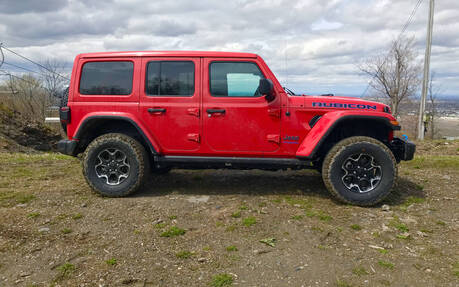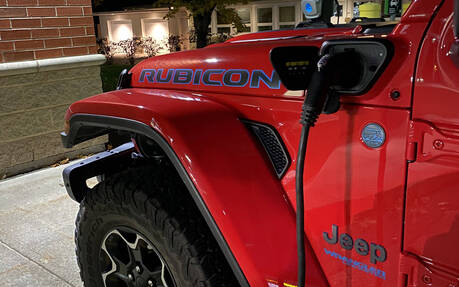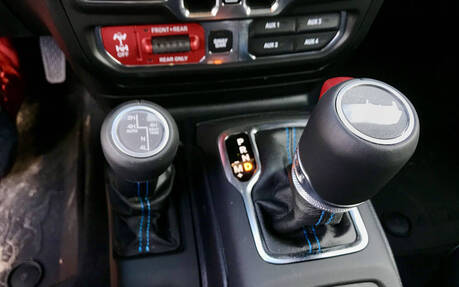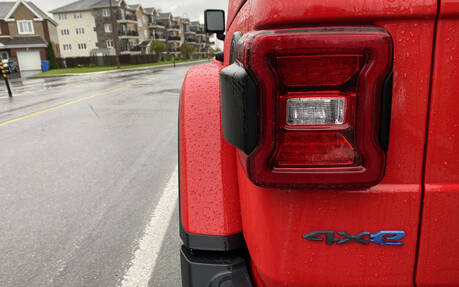2021 Jeep Wrangler 4XE: Wrangling in Fuel Efficiency
If you’d told us just a few short years ago that one of the first Jeeps to see a hybrid /battery system was going to be the Wrangler, we’d have laughed and laughed and laughed some more and maybe even questioned your sanity.
Yet, here we are.
- Also: 2021 Jeep Wrangler 4xe: Silently Conquering the Great Outdoors
- Also: 2021 Ford Bronco vs. 2020 Jeep Wrangler: The Numbers
That’s right, the first Jeep to feature a plug-in hybrid powertrain is none other than the rough and tumble, box-on-wheels Wrangler. Now, this may seem like an odd decision, but I gotta hand it to FCA; I think they made the right choice here.
Diehard Wrangler fans and owners, take a deep breath - we promise this is every bit a Jeep and Wrangler, despite the added technology and smaller engine block.

Turbocharged Toughness
The most interesting thing about this Wrangler is, obviously, the addition of a battery pack (which sits where the torque converter used to so as not to impede off-road capabilities or change the platform) that not only allows the Wrangler to travel on fully electric power, but also helps boost the Jeep’s overall performance, even off-road.
Equipped with a 2.0L turbocharged mill, the Wrangler 4xe (pronounced four-by-eee) shockingly produces only 15 less horsepower than its 3.5L V6 brother with 270 ponies. And the added turbo means it’s actually got more torque at 295 lb-ft. And let’s not forget about the added battery boost that means the combined power of the 4xe is actually 375 hp and 470 lb-ft of torque, making this particular Wrangler the most powerful one to date.
Now, when it comes to battery-only driving, the 4xe has a range of up to 35km in full EV mode. Combined with the gas engine, that means your Wrangler’s range can get as high as 600km on one tank. The battery regenerates while you drive via braking and gathers energy while cruising, but can also be plugged in for faster more immediate charging.

Environmental Off-Roader
It’s interesting to note that one of the coolest possibilities in the Wrangler 4xe is that you could potentially off-road without spewing toxic gases into the woods while you drive. Just as capable as it’s V6 counterpart, the 4xe stands to change the off-roading game in terms of fuel efficiency and even environmentally. And while the Ford Bronco only just arrived to rock the Wrangler throne a little, this stands to keep the Jeep at the top of the segment (for now).

When it comes to interior differences, there really is only one with the 4xe: the addition of 3 buttons to the left of the steering wheel that allow the driver to change between three different drive modes. These modes - Hybrid, Electric, eSave - allow you to choose how your Wrangler performs and where it pulls its power. In Hybrid mode it will flip between gas and battery depending on throttle input and how much range is left on the battery. With enough charge, selecting Electric mode will keep the Jeep in full battery-only mode, no matter what the situation. And finally, eSave mode is for optimal electric regen, as well as reduced performance to really save on both battery and gas.
Never in all my years behind the wheel of Wranglers have I experienced a fuel rating as low as I did in the 4xe. After seven days of both city and highway driving, with a few full charges at level 2 stations, as well as using the 110V outlet at home, I observed a final fuel rating of just 10.2L/100km which is absolutely insane for a Wrangler - and that’s with beefy off-road tires and zero aerodynamics on the road, as well.

But is it really a Wrangler?
Now, having driven multiple Wranglers over the years both automatic, manual, top-trim and base models, it’s safe to say that this battery-powered version drives just how you’d expect a Wrangler to drive: uncomfortably. But, that’s all part of Jeep ownership, right? In truth, the Jeep Gladiator is leagues above the Wrangler in terms of comfort, but not everyone is looking for an off-roader with a bed in the back.
Otherwise, this battery-powered edition of the Wrangler is the same as every other generation we’ve come to know and love. In all its ruggedness and toughness, this thing looks, drives, and feels just like a Wrangler should. Design-wise it is identical to the non-hybrid version save for lovely blue accents throughout (inside and out), and the addition of those three little extra buttons inside.
The roof can still come off, the doors can still be removed, and you can still live that free Jeep Wrangler life - you’ll just pay less at the pumps for owning the one with the blue decals on it.
| Test drive report | |
| Test model | 2021 Jeep Wrangler |
|---|---|
| Trim level | Unlimited Rubicon 4xe |
| Price range | $36,695 – $65,560 |
| Price as tested | 59 395 $ |
| Warranty (basic) | 3 years/60,000 km |
| Warranty (powertrain) | 5 years/100,000 km |
| Fuel economy (city/highway/observed) | 11,6 / 11,9 / 10,2 L/100km |
| Options | N/A |
| Competitive models | Ford Bronco, Toyota 4Runner |
| Strong points |
|
| Weak points |
|
| Editor's rating | |
| Fuel economy | Best fuel rating I have ever experienced with a Wrangler |
| Comfort | Typical Wrangler shake rattle and roll on the road |
| Performance | Battery plus engine power is great and almost immediate |
| Infotainment | Typical Jeep fare, easy to use and clear screen with lots of buttons/knobs |
| Driving | Steering feels disconnected, but overall solid on the road no matter the surface |
| Overall | Jeep took a risk putting a battery in the Wrangler, but it was a good one |